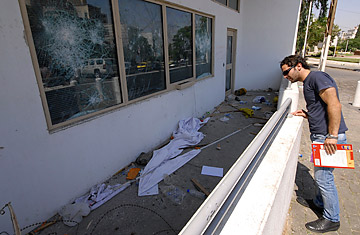
A man checks the damaged American embassy in Damascus after progovernment protesters attacked the embassy compound on Monday, July 11, 2011
The Syrian government has an almost complete checklist for President Bashar Assad's crowning overture to the opposition. A vast, swanky conference room in Damascus? Check. A huge oval table to seat hundreds of delegates to Syria's national dialogue conference? Secured. Select media to televise the event? In the bag. Regime loyalists, including Syrian Vice President Farouk al-Sharaa? Front and center. Just one item is missing: representatives of those in the blood-splattered streets who have braved bullets, snipers, tanks, threats of imprisonment, torture or worse for 17 weeks. They are boycotting.
On Monday, July 11, the conference aimed at political reconciliation continued for a second day even as the meeting itself was being roundly rejected by prominent opponents both at home and in exile. Elsewhere in the capital, Assad's goading of the West sharply escalated as proregime thugs attacked the U.S embassy in Damascus, smashing windows, raising a Syrian flag on the grounds and writing anti-U.S graffiti on the walls, media reports said. The mob also allegedly attacked U.S. ambassador Robert Ford's residence in the Syrian capital as well as the French embassy. The assaults appeared to be in response to visits by the U.S. and French ambassadors last week to the restive Syrian city of Hama, where they met with antigovernment demonstrators.
Meanwhile, some 200 people, mainly members of the ruling Baath Party along with former and current independent parliamentarians, attended the Dialogue sessions, which opened on Sunday with a minute's silence for the country's "martyrs" (no mention of who killed them) and the national anthem. Antigovernment demonstrators had designated last Friday's nationwide marches "No Dialogue" to underline their objection to the meetings. The absence of prominent opposition elements led some critics to brand the conference a "monologue"; one Arab commentator quipped that "Bashar was hosting a dialogue with Assad."
But that's not to say that the regime wasn't called to task by voices at the conferences in a manner unthinkable just months ago. "We should dismantle the security state that dominates the whole society. Now we are suffering the consequences of the police state," said Tayyeb Tizini, a professor of philosophy and one of the few opposition members to attend the government-sponsored event. "The police state will destroy every aspect of society as it keeps tabs on every Syrian citizen."
"The bloodshed must end now. So what if there are unlicensed protests?" a participant, Qadri Jamil, said early in the proceedings. "Is that an acceptable excuse for killing people?" Mohammad Khatib, a young man who said he attended not to "clap for anyone" or hear speeches he had heard before, said he was neither a government loyalist nor a member of the opposition. "I came today because of the sacrifices of my family and neighborhood," he said, addressing the conference chair, without elaborating. He said he was a member of the media and, as such, was happy with the draft media law, but he was interested in other issues.
"We have talked about a lot of things — about laws, party laws, the media law. There is a nation that is bleeding! We do not hold arms, and we will not. We are brothers. You are our parents, and we are your children," he said. He continued in an impassioned plea: "Please listen to me, just once. Everybody is far away from us, the youth. We are able to solve our problems, but we must accept — all of us — that we have all fallen short."
